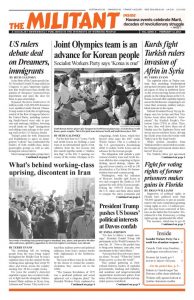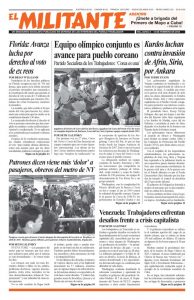“I’m here to deliver a simple message,” President Donald Trump told participants in the World Economic Forum Jan. 26. “Now is the perfect time to bring your business, your jobs, your investments to the United States.”
“America first does not mean America alone,” he said. “When the United States grows, so does the world.”
This annual gathering in Switzerland features leaders of capitalist governments, banking and industry, and academic and nongovernmental organization meritocrats galore from many of the main imperialist and capitalist powers worldwide.
The backdrop is the drawn-out downturn in profits, production and trade that has marked the international capitalist system since the 1970s, deepened by the 2007-08 financial crisis. Within that continuing long-term decline, there is a conjunctural upturn today, and the rival capitalist ruling classes and their governments assembled in Davos are in fierce competition to grab as much as they can of any profits to come.
For the first time in 18 years, a sitting U.S. president was in the house. And the leaders of Berlin and Paris were there as well.
The size of the various capitalist rulers’ home market, productivity level, strength of their currency and military, and — last but not least — how much they have been able to push back working people on wages, living and working conditions, social protections and weakening their unions is what decides their place in the pecking order in the world imperialist system. Putting all these factors together, the U.S. ruling class has no rival to the top spot, by a long shot.
Trump’s talk stressed this, saying, “The American economy is by far the largest in the world.” He touted his administration and its moves, like recent tax cuts for business and cuts in bureaucratic regulations on industry and banking, as well as advances in promoting an “America first” foreign policy. These steps have won him support from the propertied rulers at home.
“There has never been a better time to hire, to build, to invest, and to grow in the United States,” he said. He claimed economic growth, a spiraling stock market rally, jobs creation and lower unemployment — including for Blacks and Hispanics — as achievements of his administration’s first year in office.
Given how liberals worldwide, vocal at the Davos forum, revile Trump for “America first” isolationism, ironically he was the only world government representative who concretely discussed international politics.
He pushed the U.S. rulers’ efforts to “reform the international trading system” and stop “predatory behaviors” that are “distorting global markets,” speaking about trade fights with Beijing. He took credit for the talks between the governments of North and South Korea, and urged the leaders of other capitalist governments to join the U.S. rulers to push back Tehran.
Trump’s tax cuts for the bosses were popular with many of the Davos crowd. “They are now licking their lips,” Joseph Stiglitz, a columnist for the liberal British Guardian and self-professed members of the “resistance” to Trump, told the New York Times Jan. 24. “Davos Man has been able to overlook Trump’s ‘America First’ rhetoric, his anti-climate-change action, his protectionism, nativism, racism, bigotry, narcissism, misogyny, for the lucre that seems to be the true motivating force behind Davos Man.”
The Davos conferences were started decades ago by professor Klaus Schwab, who chaired Trump’s talk, based on assembling liberal-minded “globalists” seeking to impose their meritocratic views on the world.
This meritocracy is marked by its fervently held belief in its elevated intelligence, destined to wield its cosmopolitan outlook and “nudge” a stupider world for its own good. It sets itself apart, reveling in how educated, cultured and correct it is, especially in relation to the working classes, completely convinced of its “deservedness.” Its members make money setting up things like Davos to dispense advice to the high and mighty.
‘Europe’ takes the mike
French President Emmanuel Macron, the new poster boy for “globalism” and “ever increasing” integration in Europe, was a featured speaker. His “globalism” and “Europeanism” has nothing to do with an internationalist course, it’s his version of “France first.”
“France is back at the core of Europe,” he declared, “because we will never have any French success without a European success.” Macron is challenging German Chancellor Angela Merkel for the leadership of the European Union. His hope is that French capital can use the EU more to its benefit, the way the German rulers have done for so long at the expense of weaker rivals, especially in Greece, Portugal, Spain and Italy. Working people in these countries have paid dearly for Berlin’s benefit in life, limb and living conditions.
Unfortunately for Macron, the French capitalist class is too weak to push Berlin aside. The German rulers’ economy is twice as big as France’s, its industrial sector larger, its growth rate higher and its unemployment nearly one-third.
Macron’s government has made some progress in making it easier for capitalists to fire workers, resulting in workers losing jobs, including in auto and retail. But the capitalist rulers in France are still far behind the U.S. bosses in their ability to fire workers.
Merkel says she wants to work more with Macron, but will do so only in ways that don’t threaten the profits of Germany’s capitalist rulers.
Merkel didn’t get much traction at Davos. She has been unable to put together a government since the September elections, where both her Christian Democratic Union Party and its governing partner, the Social Democrats, took heavy losses. The new Alternative for Germany, which opposes more federalism in Europe and the government’s immigration policies, saw its vote grow, coming in third.
Merkel talked about the need for “multilateral solutions” and “reforms” of the EU, such as a bank union and a more “assertive defense and foreign policy.” But these are a utopia in a “union” that is fraying at the seams — with Brexit, deep divisions over how to handle immigration, and an open revolt against dictates by the German rulers from governments in newer member states in the east, primarily Poland and Hungary.
Even amid today’s economic uptick, the political crisis of the world’s capitalist rulers’ continues.

